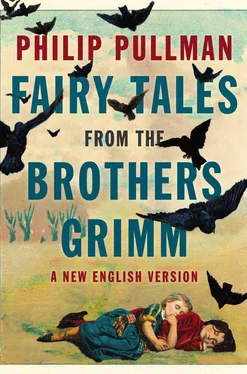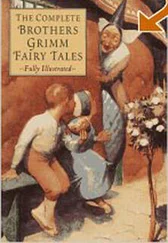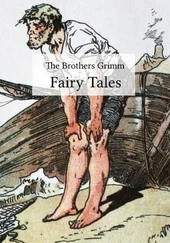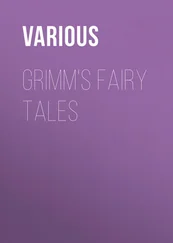‘Yes,’ said the young man, ‘and here they are.’ He took the three apples out of his pocket and gave them back to the king. ‘If you need more proof,’ he went on, ‘you can see the wound the other knights gave me when they chased me yesterday. But I’m also the knight who helped your army to victory over the enemy.’
‘If you can do that sort of thing, you’re no gardener’s boy,’ said the king. ‘Tell me, who is your father?’
‘He’s a powerful king, and I have as much gold as I need.’
‘H’mm. I see. Well, clearly I owe you some thanks,’ said the king. ‘Is there anything I can do for you?’
‘Indeed there is,’ said the young man. ‘You can give me your daughter for my wife.’
The princess laughed and said, ‘He doesn’t beat about the bush! But I knew as soon as I saw him that he wasn’t a gardener’s boy.’
And then she went to him and kissed him.
His father and mother came to the wedding, and were filled with joy. They had given up all hope of ever seeing their dear son again.
At the height of the wedding feast, the music suddenly stopped. The doors flew open, and a proud king came in with a great retinue. He strode up to the young man, embraced him, and said, ‘I am Iron Hans, and I was turned into a wild man by a spell, but you have set me free. All the treasures I have shall be yours.’
* * *
Tale type:ATU 502, ‘The Wild Man’
Source:a story told to the Grimm brothers by the Hassenpflug family and ‘Eiserne Hans’ (‘Iron Hans’), a tale in Friedmund von Arnim’s Hundert neue Mährchen im Gebirge gesammelt ( Hundred New Tales from the Mountains ; 1844)
Similar stories:Alexander Afanasyev: ‘Prince Ivan and Princess Martha’ ( Russian Fairy Tales ); Katharine M. Briggs: ‘Three-for-a-pot’ ( Folk Tales of Britain ); Andrew Lang: ‘The Hairy Man’ ( Crimson Fairy Book )
This story acquired a good deal of fame in the early 1990s, as a result of Robert Bly’s Iron John: A Book About Men (1990), a central text of the men’s movement section of the Mind, Body and Spirit shelves in bookshops. Bly maintained that modern men had become feminized and exiled by contemporary ways of life from authentic patterns of psychic development, and needed a model of masculinity that involved initiation into true manhood by those who were themselves true men. Apparently this story, and the wild man at its centre, is such a model.
There may be something in it, but my guess is that if such things work at all, they work a great deal better when you don’t know they’re doing it. Nothing is more likely to drive listeners away than a ponderous interpretation of what they’ve just marvelled at. It’s a very good story, whatever it means.
As for the sound of the poor old lame horse’s hooves, in English versions we have a choice of ‘higgledy-hop’ (D. L. Ashliman, A Guide to Folktales in the English Language ), ‘clippety clop’ (Ralph Mannheim, The Penguin Complete Grimms’ Tales for Young and Old ), ‘hobblety jig’ (Margaret Hunt, The Complete Grimm’s Fairy Tales ), ‘hippety-hop’ (Jack Zipes, Brothers Grimm: The Complete Fairy Tales ) and ‘hobbledy-clop’ (David Luke, Brothers Grimm: Selected Tales ). Luke’s version was a clear winner, so I stole that.
I think it worth noting that the German for it is hunkepuus.
There were once two brothers, one rich, the other poor. The first brother, rich as he was, gave no help to the poor one, who barely scraped a living as a corn merchant. Things went badly for him, and quite often he had hardly a crust of bread to feed his wife and children with.
One day the poor brother was pushing his cart through the forest when he noticed a high rocky mountain to one side of the path. Since he’d never seen it before, he stood looking at it with some surprise, and while he was standing there, he saw a dozen rough-looking men approaching. They hadn’t yet seen him, and thinking they might be robbers, he shoved his cart into the bushes and climbed a tree to be out of the way.
The men went to the foot of the mountain, which wasn’t far away, and called out: ‘Mount Semsi, Mount Semsi, open up!’
At once, with a rumble of rock, a cave opened in the middle of the mountain. The twelve men walked into it, and as soon as they were inside, it shut again.
The corn merchant sat in his tree wondering what to do next. But he hadn’t been there for long when there was another rumble and the cave opened once more, and the men came out carrying heavy sacks on their backs.
Once they were all out in the daylight they called out, ‘Mount Semsi, Mount Semsi, close up!’
The entrance to the cave closed up so tight that it couldn’t be seen at all, and the twelve robbers went back the way they’d come.
When they were all completely out of sight, the poor man climbed down from his tree. He was curious to see what was inside the cave, so he went to the foot of the mountain and called, ‘Mount Semsi, Mount Semsi, open up!’
The mountain opened straight away, and in he went. The whole interior of the mountain was full of silver and gold coins, of great heaps of pearls, rubies, emeralds and diamonds, piled up higher than any heap of grain the poor corn merchant had ever seen. He stood there wondering what he should do, and whether he should take any of this treasure for himself. In the end he couldn’t resist, and he stuffed his pockets full of gold coins. He left the jewels where they were, though.
Once he’d done that he looked out cautiously, tiptoed outside and called out, ‘Mount Semsi, Mount Semsi, close up!’
The mountain closed obediently, and the corn merchant went home with his empty cart.
For some time after that he was happy, because he had enough gold to buy bread for his family, and meat and wine as well. What’s more, he could give money to the poor, and so he did; he lived happily and honestly and did a lot of good. When he ran out of money he borrowed a bushel measure from his brother and went back to Mount Semsi, where he filled it with gold coins. As before, he left the jewels alone.
When he wanted to get a third helping of gold coins, he asked his brother once more for the bushel. His brother was very curious by this time; he couldn’t imagine where the corn merchant had got the money to furnish his house so richly and to live so well, so he set a trap. He covered the bottom of the bushel with pitch. And when he got it back, there was a gold coin sticking to it.
He went to see his brother straight away.
‘What did you want to measure in my bushel?’ he said.
‘Wheat and barley, as usual,’ said the corn merchant.
Then his brother showed him the gold coin.
‘Which is this then, wheat or barley? Come on, I want the truth! And if you don’t tell me exactly what you’re up to, I’ll have the law on you!’
The corn merchant had to tell his brother everything. And as soon as he heard about the treasure inside Mount Semsi, the rich man hitched the donkey to his wagon and drove there, intending to take far more gold than his brother had, and to bring home a large quantity of those jewels, too.
When he came to the mountain he called out, ‘Mount Semsi, Mount Semsi, open up!’
The mountain opened and in he went. He stood for a long time gaping at all the treasure in front of him; he didn’t know what to plunge his hands into first. Finally he went for the jewels, and thrust handful after handful into his pockets, intending to take them out to the wagon; but since his heart and soul were so bound up with the treasure, he’d forgotten the most important thing, and when he wanted to open the mountain to go out, he called, ‘Mount Simeli, Mount Simeli, open up!’
Читать дальше












